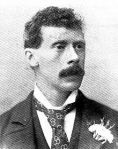You’ve heard the expression in writing that you may come to a point where you must “kill your darlings.” Some will even say kill every last one of the son of a—oops. I was channeling someone else for a moment. Some darlings are okay to keep, but some should be killed. But how to know which and who came up with the idea of the da—yeah, channeling again.
There once was a man named Q, who didn’t know what to do, then one day, decided to say, all your darlings do slay.
In 1912 Arthur Quiller-Couch became a professor at Cambridge. In his first series of lectures he coined a phrase, or at least it is our earliest noted use of said phrase and in the portion of that lecture it went like this:
 “[If] you here require a practical rule of me, I will present you with this: ‘Whenever you feel an impulse to perpetrate a piece of exceptionally fine writing, obey it—whole-heartedly—and delete it before sending your manuscript to press. Murder your darlings.”~Arthur Quiller-Couch from On the Art of Writing Lectures delivered in the University of Cambridge 1913-1914.-Page 146
“[If] you here require a practical rule of me, I will present you with this: ‘Whenever you feel an impulse to perpetrate a piece of exceptionally fine writing, obey it—whole-heartedly—and delete it before sending your manuscript to press. Murder your darlings.”~Arthur Quiller-Couch from On the Art of Writing Lectures delivered in the University of Cambridge 1913-1914.-Page 146
If this be much too much for some to grasp and too ancient I shall refer you to a more god like being in the eyes of us mere mortallaic scribes.
“Kill your darlings, kill your darlings, even when it breaks your egocentric little scribbler’s heart, kill your darlings.” ~Stephen King from his On Writing: A Memoir of the Craft.
Perhaps even that is a little too old school for some. How about this?
 “I absolutely believe in taking out things that make the story better if they aren’t there. Just as I believe in writing scenes you didn’t want to write, when you’re doing the second draft, because it makes the story work better if they are there.
“I absolutely believe in taking out things that make the story better if they aren’t there. Just as I believe in writing scenes you didn’t want to write, when you’re doing the second draft, because it makes the story work better if they are there.
Other than that, I think you’re God when you write, and you get to make the universe the way you want it. If you’ve written something really good, why would you get rid of it? Normally the bits that I really like are the bits that my readers really like too.”~Neil Gaiman , his Tumblr,com page March 18, 2012 (This link will open in this page.)
 If you are still with me then you are wondering what my advice is on how to kill your darlings. What one piece of advice can I give that you may not have heard before?
If you are still with me then you are wondering what my advice is on how to kill your darlings. What one piece of advice can I give that you may not have heard before?
Write and draft and draft until you loath, you despise, you literally wish to KILL your novel. The darlings will then leap from the page and sacrifice themselves. Until this point your darlings are in disguise.
I speak from experience. Recently I’ve been working on draft after draft of a book I began back in 2012 or earlier. 300 pages of words, non-stop for days on end have been my life. I know all of you reading can feel me on this one. I am now in stage 25 of writer draft coma and am hooked up to an IV of coffee—I only started drinking coffee a few weeks ago. I think there may be a correlation, and yes that’s how bad it’s been. No, not the story, but how dedicated I am to getting this one exactly how I want it.
In stage 25 it happened. I. Killed. A. Darling. Then. Another. I began to read and see the saccharine everywhere. Those cheesy bits of one-liners in the interior monologue of the narrator that is supposed to be cool because he represents ME! I had reached hatred level. The more I read, the more it became obvious that I, the narrator would NOT say these things. No one in their right mind would read these words and say, “Oh yes, I’ve thought those very same things myself.”
Some of you are saying at this time, “I will never loath my novel.” By loathing your novel I am in effect stating you are loathing the process of continuously laboring over the need to draft and draft. Your mind will eventually have mercy on you.
But how can you do this? I realized somethings.
One is as I said before there are things people just don’t say. They draw attention to the writing. They pull me out of the story, even my own story.
Then I determined things I had in the story were things people skipped. You know those passages in a book you will likely skip as you go along. You get to certain parts and you want to know this, not that. “That” is a darling. “This” is what you need. I found a way to get out of the way of the story. I want my stories read. Is my story the same story without “That”? If the answer is yes, then son long to “That”. Yes, I know I am using quotation marks too often but I am doing it for emphasis.
Going through my novel again I have made great cuts and slashes. Phrasing is improving left and right, pace has improved, the voices of the characters are becoming more distinct. It has taken a long time to get to this point and a lot of pain, in the literal sense. I would not change a moment of it. What I discovered is something that will help me for the remainder of my writing career.
Will this be the piece of advice that helps you get to that goal you have? I don’t know, but every tip is worth at least reading about. I’ve found I gain something each time, or I lose brain cells from the sheer duh duh duh of the person who thought they should be giving advice. Yes, go ahead and say it as you finish reading this about me. All together now. DUH DUH DUH.
But one last bit of advice. Make certain to save that previous draft. When it comes time for your Beta-Readers to read, you may find you need to Frankenstein some Darlings.
© Copyright-All rights reserved by litworldinterviews.wordpress.com 2015


Great article. Editing is difficult in many of the arts: Fashion, composing music, and in painting/drawing. There is an idea that you see in your mind’s eye that seems perfect and unique. How could you erase it and have a better outcome? But, usually it does.
LikeLiked by 1 person
Thank you. 🙂
LikeLiked by 1 person
You’re welcome.
LikeLiked by 1 person
Lol! Loved this post Ronovan! I too got to the stage where I loathed my first book… I took a YEAR to edit it, partly because I was learning the craft.
You are so right about this. For all the pain, I’m sure your novel is so much stronger now.
And isn’t there a weird sense of satisfaction and enjoyment when you finally are able to let go and kill those little darlings???
LikeLiked by 1 person
Oh yeah. Much satisfaction. They jump out and you have no problem recognizing them. It still takes time but once you realize you’ve GOT IT, it’s not has aggravating. 😉 Thank you.
Much Respect
Ronovan
LikeLiked by 1 person
I know just what you mean! It’s a great feeling of freedom, actually…
LikeLiked by 1 person
I think Neil Gaiman might be right. Yes, there are things that are unnecessary and might throw people out of the story but otherwise, just because we like something it doesn’t have to be bad. After all we write first of all for ourselves. There might be a mythical perfect manuscript we have in mind but it doesn’t exist in reality. And eventually we have to let go or we might actually kill our darlings dead. Second guessing readers is difficult and maybe it’s not part of the business. (I’ve seen people raving over parts of a story that didn’t seem important at all or even added as an afterthought and liking or disliking characters intended to cause the opposite emotion). Beta readers and editors might be able to help but eventually they are our darlings…And we must love them warts and all. And maybe love them even more because we know they aren’t perfect. But we’ve done our best and we hope they are good enough.
LikeLiked by 1 person
Very true. That’s one reason I included that last statement. I know we can get carried away sometimes so we need to hang on to that previous draft so we can resurrect the darlings if we need to. 🙂
LikeLike
🙂 lol! Okay thank you. I’ll keep each scrap just in case I need to Frankenstein my darling/s. :). (Very entertaining tip today, made me smile)
LikeLike
Thank you very much!
LikeLike
What an excellent article!
LikeLiked by 1 person
Thank you. 🙂 I was worried people might not like it.
LikeLiked by 1 person
No way. Well done! I reblogged it. 🙂
LikeLiked by 1 person
I saw that. THANK YOU!
LikeLike
Reblogged this on Silver Threading and commented:
Great writing tips here from Ronovan Writes!
LikeLike
Reblogged this on Meredith's Musings and commented:
Rononvan joins the chorus of authors who advise: “Kill Your Darlings.”
LikeLike
Very good post – I killed off one person because he’s become not-a-darling. I’ll have to think more on this – I love my characters and would feel ripped if one of them died. Maybe that’s what’s needed?
LikeLiked by 1 person
One piece of advice I’ve seen everywhere, including from Donald Maass is if you have characters that are almost duplicates, serving the same purposes, you may want to cut one. That’s up to you. Does the character add to the story, will the character play a part maybe in the next book in a series? If you can’t come up with a reason for the character to be there then you may want to consider cutting. You don’t have to though. It’s up to you.
It’s kind of like acting, and I do this will my writing as well. In acting you don’t move without a reason. Every person in the scene is there for a reason. You may have extras walking by, but they don’t have names, they are scenery.
LikeLiked by 1 person
Reblogged this on "Midnight Press".
LikeLike
Excellent tips Ron… enjoyed reading it… 🙂
LikeLiked by 1 person
Reblogged this on One Writer's Journey by Chris Owens and commented:
A hard lesson to learn, but often necessary.
LikeLike